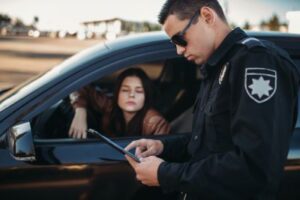We all know how it feels when you’re driving down the road and those dreaded blue and red lights start flashing in the rearview mirror and you know you’re about to get a ticket. It’s one of the worst feelings and can easily dampen your day – and your driving record. Traffic tickets are not only frucstrating, but they can also be quite expensive and have added costs you may not be aware of. So, then, how exactly does a speeding ticket get dismissed? If it is your first offense may time the ticket can be dismissed. There are more ways, so let’s find out.

How Do I Get A Speeding Ticket Dismissed?
Though it isn’t very common, there are a few instances when your traffic ticket may get dismissed, including:
- The information on your ticket is incorrect
- The police officer doesn’t appear in court
- It’s your first offense
- The police officer makes a mistake
- You have proof you were not there
- Your speed was detected using faulty equipment
What you should remember when your receive a ticket is that paying it does not dismiss the charges. Depending on the state rules and penalties, paying is an admission of guilt and will still apply points against you to your driving record. So, while we’ll explore how you can get your ticket dismissed, we’ll also discuss the importance of contesting the charges.
Ticket Information Is Incorrect
Always pay attention to the details surrounding your traffic ticket. Though it doesn’t happen often, mistakes can be made – which can land in your favor. Check the driver’s license number, license plate number, date, and other recorded information on the ticket to ensure that it is correct.
Common mistakes on tickets can include the wrong vehicle make, model, color, speed, and/or the location where the offense occurred. If there are mistakes on your ticket, and you can prove that they are errors, it will often be grounds for an automatic dismissal in court.
No-Show By the Police Officer In Court
One of the most common instances where a traffic ticket will be dismissed is when the officer who issued the ticket does not appear in court. If the officer is a no-show, the “People” cannot prove their case against you and you can request to have the charges dismissed.
Because the issuing officer was the only witness to your offense, their absence means that there is no one there to corroborate the information in the ticket. Most courts will recognize this, but will likely require at least two or more no-shows by the officer in court before considering dismissing the ticket. In other words, don’t count on the officer not showing up as a way to get your ticket dismissed easily.
First Offense
Many courts take into account the record of the driver when considering the charges of a traffic ticket. If you are lucky and have a sympathetic judge and this ticket is your only offense on record, you will be more likely to have your ticket dismissed. In addition, if you can introduce evidence of good character through witnesses, community service, good grades, etc. – the judge may show leniency as well.
If you know that you have received a ticket in the past, but maybe it was dismissed or you were able to contest the charges, you should still go into court with the idea that your record could be brought up.

Errors By the Issuing Officer
Similar to having incorrect information on the traffic ticket, if the police officer who issued your ticket makes errors during the court appearance you can point this out to the judge. It is important to listen to everything the officer says and take notes to make sure their testimony is not inconsistent or that they aren’t omitting important information.
Most errors in court are not major enough to warrant an inconsistent testimony, regardless, it is important to pay attention for your own sake.
Proof that You Were Not Near the Scene
One of the least likely chances to have your ticket dismissed is if you can prove that you were nowhere near the scene where the ticket was issued. This defense is typically used in cases of red light infractions when you receive a ticket in the mail courtesy of red-light cameras, or receive a ticket from automated speed detectors and can prove that you were elsewhere at the time of the infraction.
While you will most likely not be able to use the defense for your ticket, you should still check all the information and recall the incident as best as you can.
High Speed Detected Through Faulty Equipment
Questioning the validity and proving that the equipment used to determine whether you should receive a ticket was faulty or inaccurate is another possible defense to have your ticket dismissed. However, it can be difficult to make this defense work.
Once again, read your ticket carefully. If the officer says they stopped you using radar and the radar space on the ticket is empty, you can bring this up in court. You can also request to see calibration records of the equipment to determine whether it has been properly maintained according to department standards.
If the officer fails to mention radar in their testimony, you can ask if they were equipped with radar and whether they were trained in its use, you can also ask about what percentage of tickets that they issue relies on the radar.
Faulty equipment can also apply to your vehicle. You can take your vehicle to have the speedometer checked to ensure it was calibrated properly. If you can prove that it was not, you can use the defense that you did not know you were speeding because of a mechanical defect in your car.
Why Do I Want My Traffic Ticket Dismissed?
Fighting the charges of your speeding/traffic ticket may sound complicated to do, so why might you want to fight it? Well, not only are tickets often expensive, but they also have unseen consequences that can cost you much more than potential criminal defense lawyer fees to contest it in court.
Traffic tickets can go on your driving record and points can be assessed against you. If you continuously have incidents on the road, those points will add up and you could face losing your license or having to pay large sums for fees. At the same time, your insurance premiums will go up with traffic tickets.
For these reasons, assessing your ticket for correct information and hiring an attorney to help you contest the charges is a very good idea – especially if your driving is a bit questionable.

Related Questions
How Much Does It Cost to Fight a Traffic Ticket?
Depending on the complexity of your ticket and the attorney you hire to help, contesting the charges of your ticket can cost as little as $150 – much less than the fee that is likely on your ticket. While you are certainly able to fight the ticket yourself, hiring a lawyer can make it much less stressful and will give you a better chance of having the charges dismissed.
Traffic courts and officers are very familiar with what needs to be said and done and judges often greatly appreciate their testimony in court. If you and your attorney can provide proof or a very persuasive argument, it is possible to have the charges dismissed.
Do I Have to Show Up In Court to Fight My Traffic Ticket?
In most cases, you will be required to show up in court to contest the charges. Failure to appear can lead to additional criminal law and civil penalties – such as having your license suspended, being fined, or even leading to your arrest.
There are some instances, you should consult with your attorney, where you will not be required to appear. Some cases may include the fact that you were ticketed in a different county or state and are unable to travel back for the court hearing – your attorney will be able to advise you on this.
How Can I Improve My Driving Record?
While the best way to have a clean driving record is to avoid receiving citations entirely, this is not always possible. However, if you already have points against you on your record and are wanting to clean it up – it is possible. Driving responsibly and not speeding over a certain period can lead to having your record cleared.
Another means of cleaning up your record includes attending a state-approved defensive driving course. Driving courses prove to the court, and your insurance company, that you are serious about driving safely. Many courses are now available online and once you complete them, save the certificate and make copies to give to your insurance. Once it has been accepted, you will see the points against you begin to fall off your record, and your insurance premium will begin to drop.
One of the best ways not to have those red and blue lights appear in your rearview mirror is to not do anything to cause it. We all know sometimes it cannot be helped, whether it is negligence or ignorance. Remember, the earlier suggestions could save you hundreds possibly thousands of dollars in the long run. That would include the ticket itself and a possible increase in your insurance rates. In these circumstances, a little light on the situation can always help.

